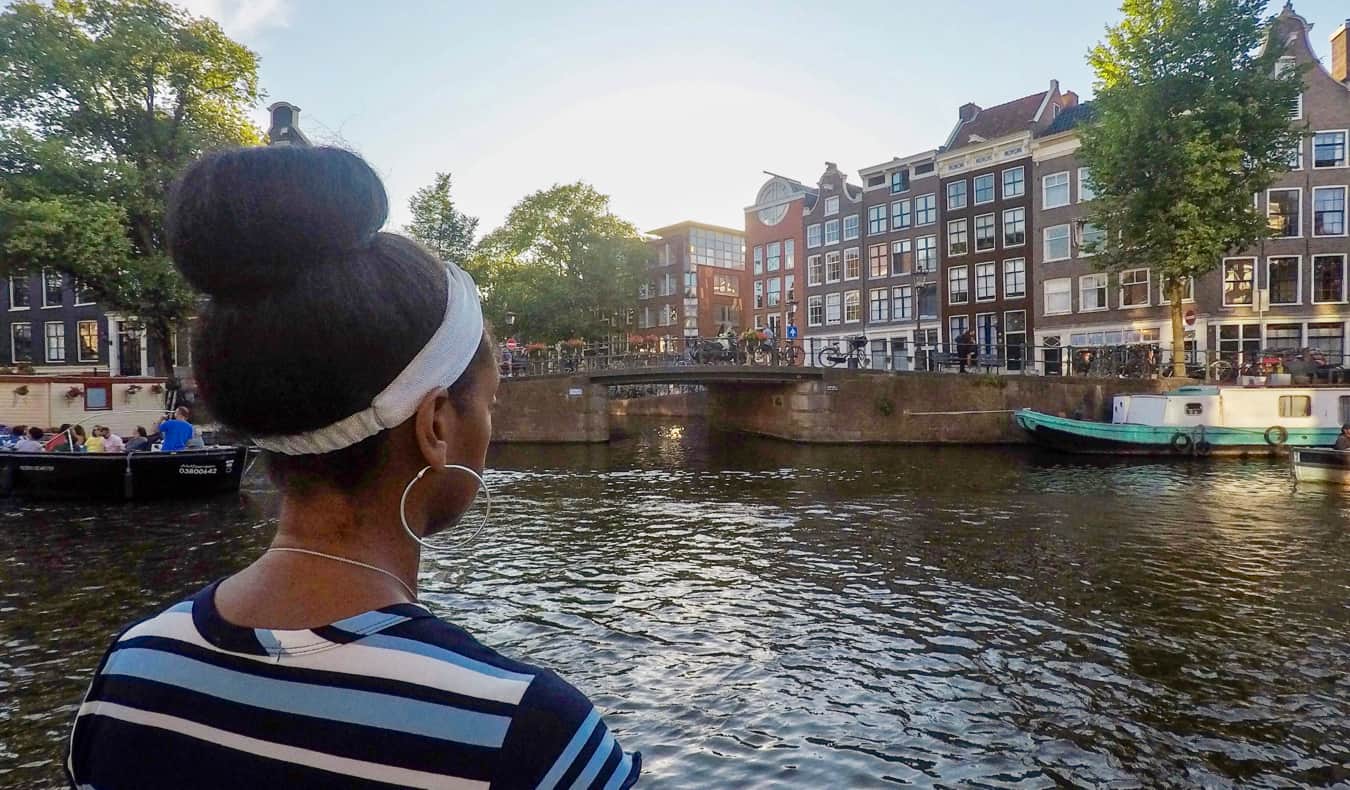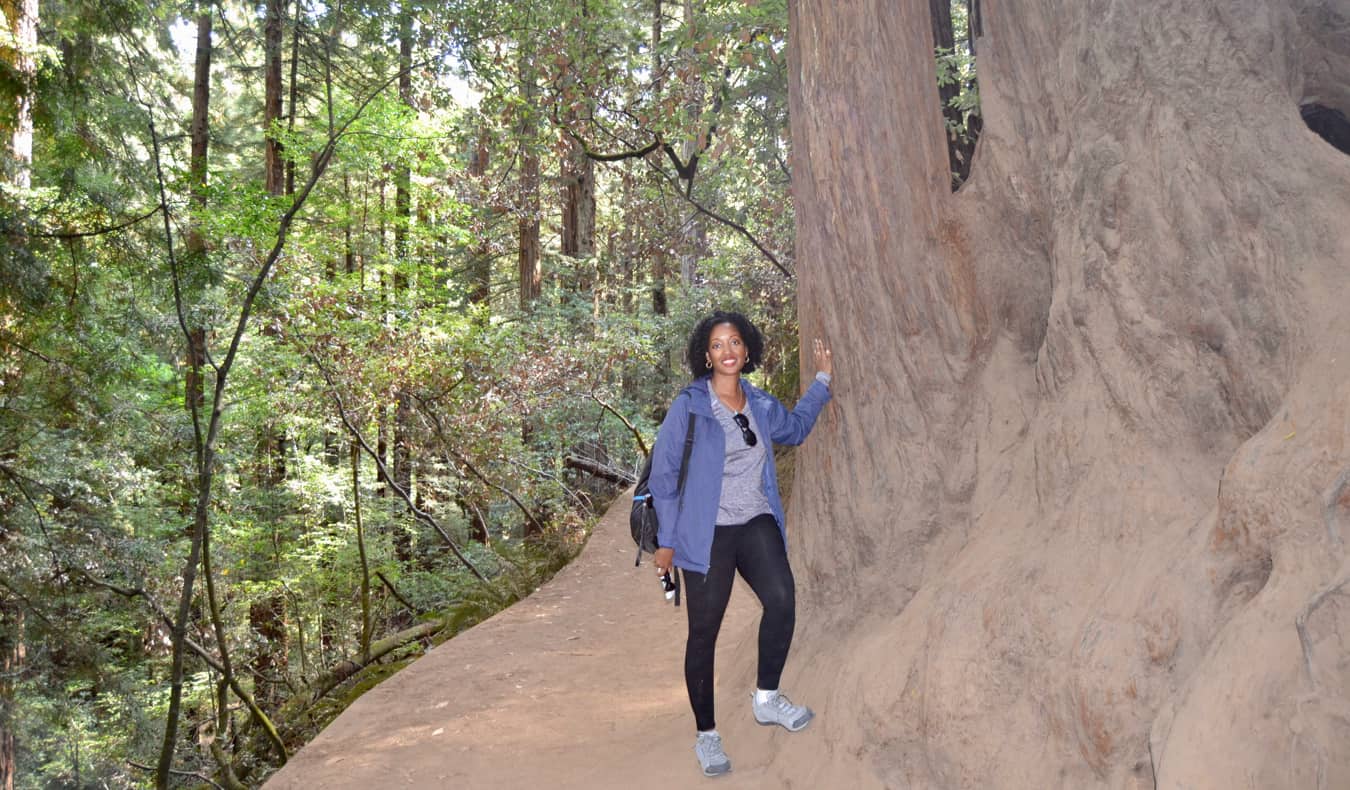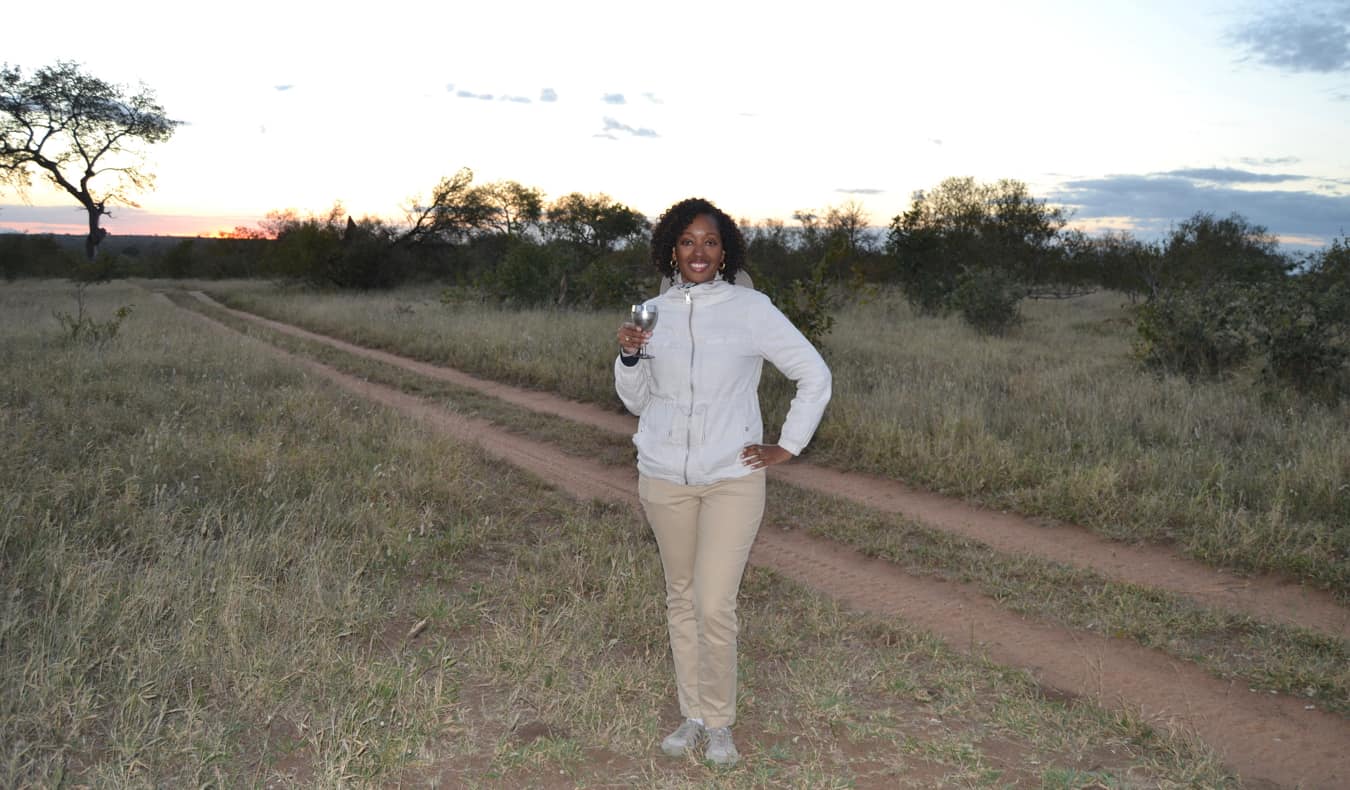
Posted: 8/13/2020 | August 13th, 2020
Today, we have a guest post from Senitra Horbrook. She’s a frequent solo traveler who uses miles and points to experience champagne travel on a budget. She has been to six continents and is working on her next goal of visiting 100 countries. In this post, she’s going to talk about Black American women and solo travel.
Sometimes when I travel outside of the United States, I take a look around at the faces of other people. I don’t often see any else who looks like me, a Black American woman. On the occasions when I do see another Black person, they’re frequently not an American but someone from an African country, usually residing in that location for work or school.
Closer to home, like in the US, Mexico, or the Caribbean, I may be more likely to see other Black American travelers at resorts or tourist attractions, but rarely do I come across another Black woman traveling solo like me.
Why is that?
It’s something I’ve always thought about. Now, I don’t proclaim to speak for all Black American women, but, after talking to others and reflecting on my own experience, I think it has to do with the following reasons:
We Probably Don’t Have Passports
According to data from the US Department of State, fewer than half of Americans have a passport. It’s unknown exactly how many Black American women have a passport, as the statistics do not break down passport issuance by race or gender. But, in my experience, the importance of having a passport was not something that was communicated to me growing up.
In my youth and even into early adulthood, getting a passport wasn’t something that I or my parents viewed as being essential to everyday life. Why would we spend almost $150 USD on something that we had no plans of using? And getting a passport for the first time requires applying in person, which may mean taking time off work to do so.
I got a passport for the first time at age 28 to go on a family vacation to Mexico. After my first visit out of the country, I wanted to fill that passport up with stamps and see every country I could, even if that meant I had to go solo. Why was I just now discovering the allure of international travel, I wondered?
We Think Travel is Too Expensive
This line of thinking is not necessarily limited to Black American women. However, it is definitely something that can hold us back.
There’s the idea that traveling costs even more if you’re alone because you have no one to split accommodation costs with. Or there’s the fact that single travelers on cruises or group tours are charged more.
But in reality, if you plan ahead you can end up spending less because you can better control the costs as a solo traveler.
We See a Lack of Representation and Role Models to Emulate
Think of the travel magazines, guidebooks, or destination advertisements you’ve seen. How often are Black travelers featured? How often is a Black woman’s solo travel experience highlighted?
When we don’t see others who look like us traveling to fantastic destinations, we start to wonder if maybe it can’t be done or that maybe it’s not for us. You all need role models that look like us.
This has been a historic problem in the travel space.
Thankfully, it’s changing.
In “Tweeting the Black Travel Experience,” a 2018 study published in the Journal of Travel Research, researchers analyzed the hashtag “#TravelingWhileBlack” and concluded that the lack of representation of Black travelers in the tourism industry helped Black travelers create communities on social media to share their travel experiences. Moreover, groups like the Black Travel Alliance are fighting for more representation in the industry.
Thanks to those social media communities, I’ve been able to read about the experiences of other Black American women solo travelers. They have inspired me – and I am sure they have inspired others.

We Think Black People Don’t Travel Internationally
A 2018 survey of African-American travelers found that more than half of the respondents said they traveled only between 100 and 500 miles from home on their most recent leisure trip. Top US destinations included Florida, New York City, and Atlanta.
When I think of my summers or family vacations while growing up, they didn’t involve leaving the country. Some years it was a trip to Disney or more local amusement parks. Other years a “vacation” was a road trip to visit family in other states. And I didn’t know anyone whose vacations encompassed a trip abroad. The only Black people I observed traveling to other countries — on television or in the news — were famous or in the military.
Our Families May Pressure Us Not to Travel Alone
Family pressure to avoid solo travel can be a common issue for all types of travelers. For Black American women, we may hear our families tell us the world is too scary for us to be out there alone. They warn us about all of the “what ifs?” They worry about us flying across oceans — despite the fact that car accidents are more common than plane crashes.
Historically, Black Americans have been more likely to travel in groups, say Gloria and Solomon Herbert, publishers of Black Meetings & Tourism magazine and one of the sponsors of the aforementioned 2018 travel study. Traveling in groups offers camaraderie and protection, they explain.
When I see Black travel — in Black-centric magazines, movies, or TV shows — it is most commonly girls’ getaways, family reunions, or cruise ship vacations with friends or family. So those of us who grab our passports and board that airplane alone seem to be trailblazers.
We’re Waiting on Friends
Movies like Girls Trip idealize fun times away with our girlfriends at big events. Unfortunately, flaky and noncommittal friends are a real impediment to having those types of travel experiences. I’ve been there!
Let’s say you’ve planned a wonderful getaway with a group of friends, but when it comes time to buy the flights, all of a sudden, they have umpteen excuses why they can’t go. Or they just keep putting you off, never saying they can’t go, but never committing to actually going.
Maybe they weren’t able to save up enough money. Maybe they’d just rather stay home. What helped me was the realization that if I was waiting for flaky friends to travel with me, I may be waiting for a long time.
While Black women aren’t the only types of people with flaky friends, this is something I’ve observed as keeping us from traveling solo. It’s time for us to embrace the unknown and travel solo, because, as the saying I’ve seen on social media goes: “They ain’t comin’, sis.”
We’re Concerned About Racism in the Destination
All travelers have some sort of safety concerns. For some, their biggest fears may be getting pickpocketed or walking down the wrong street in a bad neighborhood. Female solo travelers may fear sexual harassment or assault. For Black travelers, it goes even further: we’re often afraid of being physically targeted because of the color of our skin.
I typically do Google searches for trip reports, looking for experiences from Black women as tourists in countries I am thinking of visiting, since part of my decision-making process in determining where to travel is how the locals of that country view Black people and if that country has a history of racism. While some trip reports I find give me pause, more often than not, there’s no reason to be concerned because, in many countries, we’re just as warmly welcomed as our white counterparts.
We Want to Avoid Casual Racism
It’s not just racist-based physical assault we may fear, though. Casual racism and prolonged stares can be uncomfortable and unsettling, like being followed around in stores, being refused service in a restaurant, or being refused help from a stranger when you ask for directions.
People who stare may have never seen a Black person in real life before. A smile, nod, and “hello” can go a long way in showing friendliness and approachability. And generally, being an American with money to spend can positively influence a local’s perspective, even if their first instinct may have been to eye us suspiciously.
I’ve been approached by strangers wanting to take pictures of me because I’m “exotic.” Depending on how someone does this, I don’t necessarily view it as a bad thing. If I’m someone’s first or limited interaction with a Black American woman, I want it to be a positive experience.

We Don’t Want to Face the Stereotypes
Americans are often subject to the “ugly, loud, unruly” stereotype when traveling, especially young twentysomething travelers. But Black Americans can face additional stereotypes.
Some people’s only exposure to Black America is through television and other media, so they only know of the athletes, rappers, singers, or movie stars. So they may shout at us in passing, comparing us to people like Beyoncé, Serena Williams, or even Oprah. Annoying, yes. But no real hazard.
What’s worse are the people whose exposure to Blacks is through negative news and other media that portray us as criminals. Those people may display signs of overt or casual racism, like clutching their purse when you approach or crossing the street as you’re about to walk by.
Even when traveling in the United States, Black female travelers may be more likely to experience poor customer service due to stereotypes, one example being that Black people don’t tip. You could be a great tipper, but that stereotype can potentially set you up for defeat as soon as you enter an establishment.
We have to work to prove we’re different from the stereotypes others may have prejudged us by. My first instinct is to make eye contact and give someone a friendly smile and nod, even if they don’t smile back. It’s great to get a friendly smile in return, but if I feel I’m experiencing hostile behavior, I’ll leave and remove myself from that situation.
We Don’t Know How to Swim
Many of the best vacations involve water activities: going out on a boat, jet skiing, scuba diving, snorkeling, or a refreshing swim in a cool hotel pool on a hot day. But what if you don’t know how to swim?
According to a 2017 study from the USA Swimming Foundation, 64% of African-American children have no or low swimming ability. By comparison, 40% of Caucasian children are nonswimmers.
We may grow up in a city or neighborhood without access to a community pool. Our parents and family members don’t know how to swim, so they can’t teach us. Lessons are expensive. And there’s the not-so-distant history of racial discrimination and segregation at private pools and athletic clubs. Black people simply weren’t allowed in.
I grew up afraid of the water and did not know how to swim until I enrolled in lessons at age 26. Knowing how to swim has greatly enhanced the types of travel experiences I have.
We Worry About What to Do with Our Hair
For many Black women, our hair is not just “wash and go.” Styling our hair can be an extensive process. Sometimes we’ve paid a good sum of money to get our hair styled at the salon before a trip. We don’t want to get sweaty or get our hair wet (if straightened, wetting our hair can cause it to revert back to its natural texture). Or it can get tangled or matted.
And if trying to pack light and carry-on only, travel-size hair products just aren’t going to do the job, especially for more than a few days. We want to be cute when we’re “flexin’ for the ‘gram”, that is, posing for our Instagram pictures.
All of these can be reasons why Black women are hesitant to travel.
I have dealt with the “hair issue” in a variety of ways. Earlier in my travels, I’d get my hair weaved or have extensions added, so I could “wake up and go.” And since my real hair was protected underneath the weave, I could go swimming or get my hair wet without worrying about damaging my real hair.
More recently, I’ve worn my hair styled very simply, often in a bun or pulled back. And since I wear my natural texture instead of straightened, I don’t worry about getting it wet.
For Black American women who want to travel solo, there are obstacles and fears to overcome, but it can be done. Like many things worth doing, I find that the rewarding feeling of traveling solo outweighs the fears I may have.
Even though I may not often see other travelers, especially Americans, who look like me, I’m hopeful to see more ladies like myself having wonderful solo adventures as more Black travel experiences are highlighted.
Senitra Horbrook has spoken at numerous travel conferences in the US and enjoys sharing her tips on solo travel and strategies to earn many frequent flyer miles and hotel points through credit card rewards. A journalist, you can connect with her online on Instagram or Twitter.
Book Your Trip: Logistical Tips and Tricks
Book Your Flight
Find a cheap flight by using Skyscanner or Momondo. They are my two favorite search engines, because they search websites and airlines around the globe so you always know no stone is being left unturned.
Book Your Accommodation
You can book your hostel with Hostelworld as they have the largest inventory. If you want to stay somewhere other than a hostel, use Booking.com, as they consistently return the cheapest rates for guesthouses and hotels.
Don’t Forget Travel Insurance
Travel insurance will protect you against illness, injury, theft, and cancellations. It’s comprehensive protection in case anything goes wrong. I never go on a trip without it, as I’ve had to use it many times in the past. I’ve been using World Nomads for ten years. My favorite companies that offer the best service and value are:
- World Nomads (for everyone below 70)
- Insure My Trip (for those 70 and over)
- Medjet (for additional repatriation coverage)
Looking for the best companies to save money with?
Check out my resource page for the best companies to use when you travel! I list all those I use — and they’ll save you time and money too!
The post Why Don’t More Black American Women Travel Solo? appeared first on Nomadic Matt's Travel Site.
August 13, 2020 at 01:26PM
fom https://ift.tt/2E378JS
by IHholiday Travel trip
No hay comentarios:
Publicar un comentario